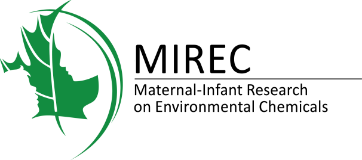
Prenatal Exposure to Legacy PFAS and Neurodevelopment in Preschool-Aged Canadian Children: the MIREC Cohort.
Goodman CV, Till C, Green R, El-Sabbagh J, Arbuckle TE, Hornung R, Lanphear BP, Séguin JR, Booij L, Fisher M, Muckle G, Bouchard MF, Ashley-Martin J. Neurotoxicology and Teratology. 2023 Jul-Aug;98:107181. doi: 10.1016/j.ntt.2023.107181
Question: What is the association between prenatal exposure to perfluoroalkyl substances (PFAS) and child neurodevelopment?
PFAS are chemicals added to many products such as cookware, furniture, clothing, and electronics for their oil-, water-, and heat- resistant properties. Few studies have investigated whether exposure to these chemicals during pregnancy influences child neurodevelopment.
What did the researchers do:
Chemists measured levels of three different PFAS in first trimester blood samples from the MIREC participants. Researchers assessed children’s intelligence (IQ), working memory, and ability to plan and organize at ages 3-4 years. They used statistical models to assess the associations between PFAS levels and child neurodevelopmental outcomes. Researchers also determined whether associations between PFAS and neurodevelopment differed according to child sex.
What did they find:
Higher levels of each PFAS were associated with slightly lower intelligence scores in male but not female children. Specifically, when PFAS concentrations were doubled in statistical models, the IQ scores in males were, on average, reduced by approximately three points. These analyses accounted for other factors that could influence IQ, such as maternal education, age, smoking and the quality of the children’s home environment. In contrast to the associations seen with IQ, PFAS levels were not associated with children’s working memory or ability to plan or organize in either males or females.
What does this mean:
This research demonstrates that prenatal exposure to PFAS may influence IQ in preschool-aged males. Future research is necessary to understand if these associations persist over time.
MIREC Année all rights reserved - Privacy policy
Website by Riposte


